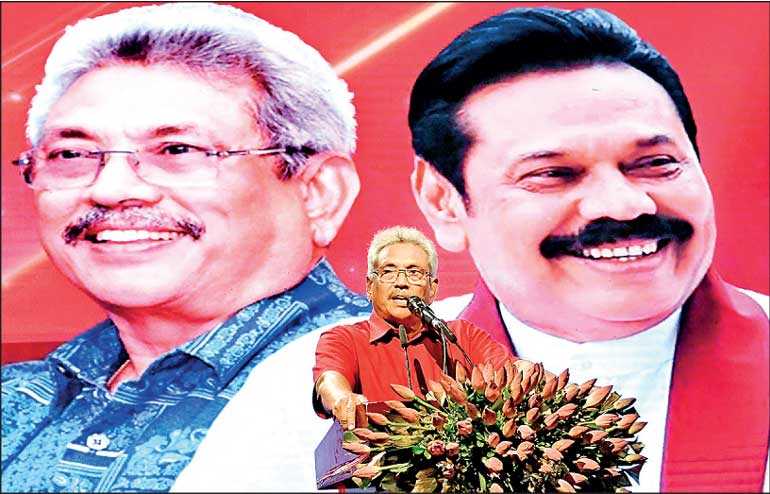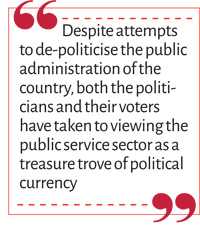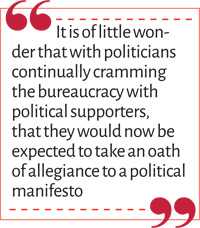Sunday Feb 22, 2026
Sunday Feb 22, 2026
Saturday, 2 January 2021 00:10 - - {{hitsCtrl.values.hits}}

This Government’s decision to include in the oath taken by public servants the pledge to uphold a political manifesto has set the public services in Sri Lanka down a dangerous path. While the country’s public administration is no stranger to politicisation, we are now poised to witness the bureaucracy take on a public political persona – Pic by Shehan Gunasekara
 “Enjoy your time in public service. It may well be one of the most interesting and challenging times ahead” – Donald Rumsfeld, former US Secretary of Defence
“Enjoy your time in public service. It may well be one of the most interesting and challenging times ahead” – Donald Rumsfeld, former US Secretary of Defence
When a Government enjoys a sweeping mandate through a landslide victory at the polls, it is not long before they begin to take steps to shape all aspects of public life. In Sri Lanka, with the political environment reflecting the whims and fancies of the Government, attention has turned to the public services of the country.
According to a circular issued by the Ministry of Public Services, Provincial Councils and Local Governments, when State employees resume work on 1 January 2021 they will be required to take an oath not only vowing to serve the public but also to uphold the political manifesto of President Gotabaya Rajapaksa.
Shifting away from public service
It was in 2008, under President Mahinda Raja-paksa, that public servants were first required to begin the New Year by swearing an oath to serve the public of Sri Lanka. Thirteen years later and the emphasis of this oath has taken a steady shift away from public service and towards one with a more political overture.
Accordingly, the political addition to the oath reads as “…to create a disciplined, law abiding and healthy society under the vision of ‘Vistas of Prosperity and Splendour’”. This reference to the political manifesto released by President Gotabaya Rajapaksa during his campaign in 2019 has raised eyebrows amongst both the public and the public sector.
While some are questioning why the political ambitions of a Government are being thrust upon the public servants in the form of an oath of allegiance, others are bemoaning the continual decline and politicisation of the public services.
Down a dangerous path
It is considered the norm in most democratic nations around the world that the cabinet of ministers uphold and implement the political policies presented to the public. In turn, the public servants are entrusted with ensuring the smooth unhindered operations of the public services, devoid of political interference. When these two arms work in tandem, it is expected that the policies and visions of a Government will be implemented, while remaining within the legal frameworks of a country.
However, this Government’s decision to include in the oath taken by public servants the pledge to uphold a political manifesto has set the public services in Sri Lanka down a dangerous path. While the country’s public administration is no stranger to politicisation, we are now poised to witness the bureaucracy take on a public political persona.
Sri Lanka’s public service
Sri Lanka’s public service was first introduced to the country by the British in 1798, known then as the Ceylon Civil Service (CSC). For nearly a century, it is considered that the CSC played the dual role of Chief Executor and Chief Legislator of the State.
It was only through the subsequent constitutional developments between 1832 and 1921 that the CSC began to enjoy a greater degree of independence from the political scope of the country. It was finally with the introduction of the Soulbury Constitution of 1948 that the Public Service Commission (PSC) enjoyed complete independence, free from the constraints of political interference.
Article 160 (1) of the Soulbury Constitution empowered the PSC to ensure the public administration was centered on the principles of impartiality and political neutrality. Unfortunately, the ideals of the public administration was not long lived.
On account of the Sinhala Only Act of 1956, introduced by Prime Minister S.W.R.D. Bandaranaike, the public services underwent wide-scale restructuring. With the language of the majority made the official language, coupled with universal free education dating back to 1945, a greater number of educated Sinhala-speaking middle class citizens began entering the public services. This made up a greater portion of Bandaranaike’s newly acquired vote base, providing him with an opportunity to further strengthen his grasp on their loyalty.
While the official independence of the administrative services continued to remain protected under the 1948 Constitution, the politicians began to identify the potential of securing political patronage through the growing public sector. This also coincided with a period of increased hostility towards the bureaucracy from the politicians.
A divide emerged between politicians who relied on the ethno-religious interests of the majority, and those who wished to preserve the bureaucratic ideals left behind by the British. Considered by the Government to be elitists and uninterested in the social welfare programs, the public service was soon viewed as an obstacle to Bandaranaike’s political programs. 
Final nail in the coffin of independent public services
However, it was not until the introduction of the 1972 Constitution that saw the proverbial final nail in the coffin of the independent public services in Sri Lanka. The country’s bureaucracy was brought under the direct control of the Cabinet of Ministers and the National State Council.
The Cabinet of Ministers was now responsible for the appointment, transfers and disciplinary matters of public servants, as stated in Article 106 (1) of the new Constitution. For the first time since Independence, the country’s administrative sector found itself directly under the political leadership of the country. This placed the bureaucracy on the path towards complete politicisation. The administration of the country was no longer focused on “public service” but was rather redirected towards ensuring the political goals of the Government of the day.
The stage had now been set for politicians to repurpose the public administration sector as a recruitment office for their political supporters.
While the PSC was re-established under the 1978 Constitution, with all the same powers it enjoyed prior to 1972, it was still subordinate to the Cabinet of Ministers. It was only in 2001 with the introduction of the 17th Amendment that the PSC was once again empowered to act independently of political influence. However, yet again the political neutrality enjoyed by the administration of the country was short lived, and the enactment of the 18th Amendment in 2010 saw the PSC placed back under the purview of the Cabinet of Ministers. 2015 saw yet another reversal to an independent PSC with the introduction of the 19th Amendment of the Constitution. Yet as was now becoming a trend, this too was even shorter lived, when earlier this year (2020) the PSC was once again brought under the purview of the President through the adoption of the country’s 20th Constitutional Amendment.
A treasure trove of political currency
Despite attempts to de-politicise the public administration of the country, both the politicians and their voters have taken to viewing the public service sector as a treasure trove of political currency. With over 1.1 million people employed in the public service sector (according to the 2016 statistics), and coupled with better benefits than those enjoyed by the private sector, demand for public sector jobs grows on a daily basis.
It is therefore little wonder that with politicians continually cramming the bureaucracy with political supporters, that they would now be expected to take an oath of allegiance to a political manifesto. The ideals of a public administration with the sole focus on serving the public have fast become a thing of the past. The oversized public service in Sri Lanka has now become a tool of the politicians, with the sole purpose of furthering the ambitions of a few ahead of the needs of the greater public.